


|
| ||
|
|
|
|
|
|
SILVER EDITION

|


|
SILVER EDITION |
|
Publication History
Cover Overview |
Reviews and Previews
Chapter Overview |
Word Cloud
[NEW]
First Chapter Preview [NEW] |
Cover Gallery (year)
Cover Gallery (edition) |
 Cover Overview
Cover Overview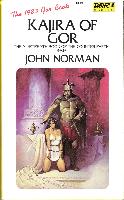
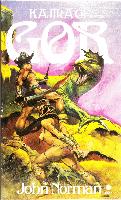
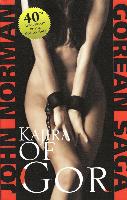

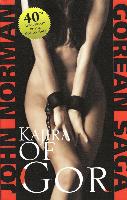
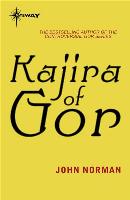

 Reviews and Previews
Reviews and Previews Chapter Overview
Chapter OverviewHere is an overview of the 37 chapters in Kajira of Gor:
|
1. The Studio
2. The Crate 3. Corcyrus 4. A Night in Corcyrus 5. Miles of Argentum; Drusus Rencius Speculates on What I Might Bring as a Slave; I Have Obtained Greater Freedoms 6. The Sirik 7. Bracelets 8. I Have Benn in the House of Kliomenes; The Room in the Inn of Lysias; War 9. I Determine to Take Cognizance in the City 10. I Have Taken Cognizance in Corcyrus; We are Returning to the Palace 11. Susan Has Been Beaten; Ligurious Speaks With Me; There is Nothing to Fear; I am Safe in the Palace 12. I Sit Upon the Throne; I Wait in the Hall 13. The Golden Cage; Miles of Argentum Speaks With Me 14. The Camp of Miles of Argentum; Two Men 15. Alarm Bars 16. I Am on the Viktel Aria, In the Vicinity of Venna 17. The Cement Platform 18. The Leash 19. The Trunk |
20. The Stream; The Stone
21. The Road 22. The Wagon; Caught! 23. The Chain 24. The Mill 25. I Leave the Mill 26. I Must Get Up Early for School 27. School 28. School; I Have Graduated 29. Hassan, the Slave Hunter 30. Sheila, the Tatrix of Corcyrus 31. Argentum 32. The Throne Room 33. The Inquiry; The Outcome of the Inquiry; I Am the Slave of Miles of Argentum 34. Ligurious is Served by Two Slaves 35. I Am Proven a Natural Slave Before Drusus Rencius, Whom I Love; The Silver Tarsk 36. In the Quarters of my Master 37. Afterword |
 Word Cloud
Word CloudThe image below shows the most often used words and terms within Kajira of Gor. The larger the size, the more often the word or term occurs in the text.
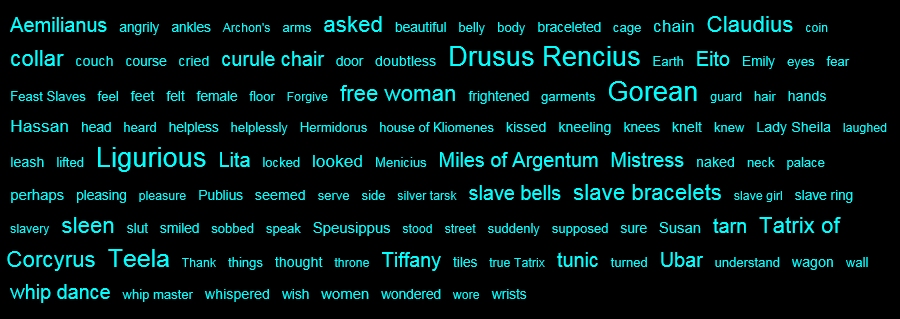
 First Chapter Preview
First Chapter Preview
1
The Studio
"Do you not see it?" asked the man.
"Yes," said the fellow with him.
"It is incredible," said another.
"The resemblance is truly striking," said the second man.
"Please turn your profile towards us, and lift your chin, Miss Collins," said the first man.
I complied.
I was in a photographer's studio.
"A little higher, Miss Collins," said the first man.
I lifted my chin higher.
"You may change in here," had said the man earlier, indicating a small dressing room off the studio. I had been handed a pair of clogs, a white silk blouse and a pair of black shorts.
"No brassiere or panties," he had said.
I had looked at him.
"We want no lines from them," he said.
"Of course," I had said.
The shorts were quite short, and, even without the panties, at least a size too small. The blouse, too, even without the brassiere, was tight.
"Please tie up the blouse, in front," he said. "We want some midriff."
I had complied.
"Higher," he had suggested.
I had complied.
I had then been, to my puzzlement, photographed several times, from the neck up, front view and profile, against a type of chart, on which appeared various graduated lines, presumably some type of calibrating or measuring device. The lines, as nearly as I could determine, however, correlated neither with inches nor centimeters.
"Now, please, step into the sand box," he had said.
I had then stepped onto the sand, in the wide, flat box, with the beach scene projected onto the large screen behind me. Then, for several minutes, the photographer moving about me, swiftly and professionally, sometimes almost intimately close, and giving me commands, the camera clicking, I had been posed in an incredible variety of positions. Men, I had thought, must enjoy putting a woman thusly through her paces. Some of the shots were almost naughty. I think, too, given the absence of a brassiere and panties, and the skimpiness and tightness of the shorts, and the tightness of the blouse, doubtlessly calculated features of my apparel, there would be little doubt in the minds of the observers as to the lineaments of my figure. I did not object, however. In fact I rather enjoyed this. I think I am rather pretty.
I was now standing in the sand, my left side facing the men, my chin lifted. The lights were hot. To my left were the lights, the tangles of cord, the men. To my right, in contrast, there seemed the lovely, deserted beach.
"She is pretty," said one of the men.
"She is pretty enough to be a Kajira," said one of the men.
"She will be," laughed another.
I did not understand what they were talking about.
"Do not see such a woman merely in terms of such predictable and luscious commonalities," said the first man. "You see clearly her potential for us, do you not?"
"Of course," said the second man.
I did not understand them.
"Turn on the fan," said the first man.
I then felt a cool breeze, blown by the large fan in front of me. In the heat of the lights this was welcome.
* * * *
"This coin, or medal, or whatever it is, is very puzzling," had said the gentle, bespectacled man, holding it by the edges with white, cotton gloves, and then placing it down on the soft felt between us. He was an authenticator, to whom I had been referred by a professional numismatist. His task was not to appraise coins but to render an informed opinion on such matters as their type and origin, where this might be obscure, their grading, in cases where a collaborative opinion might be desired, and their genuineness.
"Is it genuine?" I asked.
"Who sold you this piece," asked the man, "a private party? What did you pay for it?"
"It was given to me," I said, "by a private party."
"That is extremely interesting," said the man.
"Why?" I asked.
"It rules out an obvious hypothesis," said the man. "Yet such a thing would be foolish."
"I do not understand," I said.
"Puzzling," he mused, looking down at the coin on the felt between us, "puzzling."
I regarded him.
"This object," he said, "has not been struck from machine-engraved dies. Similarly, it is obviously not the result of contemporary minting techniques and technology. It is not the product, for example, of a high-speed, automated coin press."
"I do not understand," I said.
"It has been struck by hand," he said. "Do you see how the design is slightly off center?"
"Yes," I said.
"That is a feature almost invariably present in ancient coins," he said. "The planchet is warmed, to soften the metal. It is then placed between the dies and the die cap is then struck, literally, with a hammer, impressing the design of the obverse and reverse simultaneously into the planchet."
"Then it is an ancient coin?" I asked.
"That seems unlikely," he said. "Yet the techniques used in striking this coin have not been used, as far as I know, for centuries."
"What sort of coin is it?" I asked.
"Too," he said, "note how it is not precision milled. It is not made for stacking, or for storage in rolls."
I looked at him. It did not seem to me he was being too clear with me. He seemed independently fascinated with the object.
"Such coins were too precious perhaps," he said. "A roll of them might be almost inconceivable, particularly in the sense of having many such rolls."
"What sort of coin is it?" I asked.
"You see, however," he asked, "how the depth of the planchet allows a relief and contrast of the design with the background to an extent impossible in a flat, milled coin?"
"Yes," I said.
"What a superb latitude that gives the artist," he said. "It frees him from the limitations of a crude compromise with the counting house, from the contemporary concessions which must be made to economic functionalism. Even then, in so small and common an object, and in so unlikely an object, he can create a work of art."
"Can you identify the coin?" I asked.
"This, in its depth and beauty, reminds me of ancient coins," he said. "They are, in my opinion, the most beautiful and interesting of all coins."
"Is it an ancient coin?" I asked.
"I do not think so," he said.
"What sort of coin is it, then?" I asked.
"Look here," he said. "Do you see how this part of the object, at the edge, seems flatter, or straight, different from the rest of the object's circumference?"
"Yes," I said. To be sure, one had to look closely to see it.
"This object has been clipped, or shaved," he said. "A part of the metal has been cut or trimmed away. In this fashion, if that is not noted, or the object is not weighed, it might be accepted for, say, a certain face value, the individual responsible for this meanwhile pocketing the clipped or shaved metal. If this is done over a period of time, with many coins, of course, the individual could accumulate, in metal value, a value equivalent perhaps to one or more of the original objects."
"Metal value?" I asked.
"In modern coinage," he said, "we often lose track of such things. Yet, if one thinks about it, at least in the case of many coins, a coin is a way in which a government or ruler certifies that a given amount of precious metal is involved in a transaction. It saves weighing and testing each coin. The coin, in a sense, is an object whose worth or weight, in standardized quantities, is certified upon it, and guaranteed, so to speak, by an issuing authority. Commerce as we know it would be impossible, of course, without such objects, and notes, and credit and such."
"Then the object is a coin?" I said.
"I do not know if it is a coin or not," said the man.
"What else could it be?" I asked.
"It could be many things," he said. "It might be a token or a medal. It might be an emblem of membership in an organization or a device whereby a given personage might be recognized by another. It might be a piece of art intended to be mounted in jewelry. It might even be a piece in some game."
"Can you identify it?" I asked.
"No," he said.
The object was about an inch and a half in diameter and about three eighths of an inch in thickness. It was yellowish, and, to me, surprisingly heavy for its size.
"What about the letter on one side?" I asked.
"It may not be a letter," he said. "It may be only a design." It seemed a single, strong, well-defined character. "If it is a letter," he said, "it is not from an alphabet with which I am familiar."
"There is an eagle on the other side," I said, helpfully.
"Is there?" he asked. He turned the coin on the felt, touching it carefully with the cotton gloves.
I looked at the bird more closely.
"It is not an eagle," he said. "It has a crest."
"What sort of bird is it?" I asked.
He shrugged. "Perhaps it is a bird from some mythology," he said, "perhaps a mere artist's whimsy."
I looked at the fierce head on the surface of the yellowish object.
It frightened me.
"It does not appear to be a whimsy," I said.
"No," he smiled. "It doesn't, does it?"
"Have you ever seen anything like this before?" I asked.
"No," he said, "aside, of course, from its obvious resemblance to ancient coins."
"I see," I said.
"I was afraid," he said, "when you brought it in, that you were the victim of an expensive and cruel hoax. I had thought perhaps you had paid a great deal of money for this, before having its authenticity ascertained. On the other hand, it was given to you. You were thus not being defrauded in that manner. As you perhaps know coins can be forged, just as, say, paintings and other works of art can be forged. Fortunately these forgeries are usually detectable, particularly under magnification, for example, from casting marks or filing marks from seam joinings, and so on. To be sure, sometimes it is very difficult to tell if a given coin is genuine or not. It is thus useful for the circumspect collector to deal with established and reputable dealers. Similarly the authentication of a coin can often proceed with more confidence if some evidence is in hand pertaining to its history, and its former owners, so to speak. One must always be a bit suspicious of the putatively rare and valuable coin which seems to appear inexplicably, with no certifiable background, on the market, particularly if it lacks the backing of an established house."
"Do you think this object is genuine?" I asked.
"There are two major reasons for believing it is genuine," he said, "whatever it might be. First, it shows absolutely no signs of untypical production, such as being cast rather than struck, of being the result of obverse-reverse composition, or of having been altered or tampered with in any way. Secondly, if it were a forgery, what would it be a forgery of? Consider the analogy of counterfeiting. The counterfeiter presumably wishes to deceive people. This end would not be well served by producing a twenty-five dollar bill, which was purple and of no familiar design. There would be no point in it. It would defeat his own purposes."
"I understand," I said.
"Thus," said the man, "it seems reasonable to assume that this object, whatever it is, is genuine."
"Do you think it is a coin?" I asked.
"It gives every evidence of being a coin," he said. "It looks like a coin. Its simplicity and design do not suggest that it is commemorative in nature. It has been produced in a manner in which coins were often produced, at least long ago and in the classical world. It has been clipped or shaved, something that normally occurs only with coins which pass through many hands. It even has bag marks."
"What are those?" I asked.
"This object, whatever it is," said the man, "can clearly be graded according to established standards recognized in numismatics. It is not even a borderline case. You would not require an expert for its grading. Any qualified numismatist could grade it. If this were a modern, milled coin, it would be rated Extremely Fine. It shows no particular, obvious signs of wear but its surface is less perfect than would be required to qualify it as being Uncirculated or as being in Mint State. If this were an ancient coin, it would also qualify as being Extremely Fine, but here the grading standards are different. Again there are almost no signs of wear and the detail, accordingly, is precise and sharp. It shows good centering and the planchet, on the whole, is almost perfectly formed. Some minor imperfections, such as small nicks, are acceptable in this category for ancient coins."
"But what are bag marks?" I asked.
"You may not be able to detect them with the naked eye," he said. "Use this."
From a drawer in the desk he produced a boxlike, mounted magnifying glass. This he placed over the coin, and snapped on the desk lamp.
"Do you see the tiny nicks?" he asked.
"Yes," I said, after a moment.
"Those are bag marks," he said. "They are the result, usually, of the coin, or object, being kept with several others, loose, in, say, a bag or box."
"There might, then," I asked, looking up from the magnifying device, "be a large number of other objects like this somewhere?" That I found a very interesting thought.
"Surely," said the man. "On the other hand, such marks could obviously have other causes, as well."
"Then all the evidence suggests that this is a coin?" I said.
"The most crucial piece of evidence," he said, "however, suggests that it cannot be a coin."
"What is that?" I asked.
"That it fits into no known type or denomination of coin."
"I see," I said.
"As far as I know," he said, "no city, kingdom, nation or civilization on Earth ever produced such a coin."
"Then it is not a coin," I said.
"That seems clear," he said. "No," he said. "Do not pay me."
I replaced his fee in my purse.
"The object is fascinating," he said. "Simply to consider it, in its beauty and mystery, is more than payment enough."
"Thank you," I said.
"I am sorry that I could not be more helpful," he said. "Wait!" he called after me. I had turned to the door. "Do not forget this," he said, picking up the small, round, heavy object on the felt.
I turned back to face him. I was angry. I had thought that the object might have had some value.
"It is only some sort of hoax," I said, bitterly.
"Perhaps," he said, smiling, "but, if I were you, I would take it along with me."
"Why?" I asked.
"It has metal value, or bullion value," he said.
"Oh?" I asked.
"Yes," he said. "Do you not understand what it is composed of?"
"No," I said.
"It is gold," he said.
I had hurried back and snatched the object, and put it in my purse. I had then, hurriedly, left his office.
* * * *
"Turn up the fan," said the man, he who seemed in charge of those in the photographer's studio. The fan was turned up. "Keep facing as you are," he said, "your left side to us, your chin lifted. That's good." My hair was lifted and blown back. I felt the breeze from the fan, too, pressing my blouse back against me, even more closely. It rippled the silk at the sides. It tugged at the collar. The ends of the blouse, where I had tied them together, high on my midriff, as the man had requested, fluttered backward. "Now arch your back and lift your hands to your hair," he said. "Good, excellent," he said. I was not a professional model. I had often thought that I was beautiful enough to be one, but I was not one.
I heard the camera clicking. "Excellent," said the man. "Now look at us, over your left shoulder."
I had had the yellowish, metallic object assayed. It had indeed been gold. I had sold it to a bullion dealer. It would be melted down. I had received eighteen hundred dollars for it.
"Now, face us, crouching slightly, your hands at your hair," said the man. "Good."
These men, perhaps, wanted to train me as a model. Yet I suspected this was not their true purpose. I was not particular as to what might be their true purpose, incidentally. They obviously possessed the means to pay me well.
"Now smile, Tiffany," said the man. "Good. Now crouch down in the sand, your hands on your knees. Good. Now put your left knee in the sand. Have your hands on your hips. Put your shoulders back. Good. Smile. Good."
"Good," said one of the other men, too. I could see they were pleased with me. This pleased me, too. I now felt more confident that they might hire me. For whatever object they wanted me I could sense that my beauty was not irrelevant to it. This pleased me, as I am vain of my beauty. Why should a girl not use her beauty to serve her ends, and to get ahead?
"Now face the camera directly, with your left hand on your thigh and your right hand on your knee," said the man, "and assume an expression of wounded feelings. Good."
"She is good," said one of the other men.
"Yes," agreed another.
"Now assume an expression of apprehension," said the first man.
"Good," said the second man.
I normally worked at the perfume-and-notions counter in a large department store on Long Island. It was there that I had been discovered, so to speak. I had become aware, suddenly, that I was the object of the attention of the man who was now directing this photography session. "It is incredible," he had said, as though to himself. He seemed unable to take his eyes from me. I was used to men looking at me, of course, usually pretending not to, usually furtively. I had been chosen to work at that counter because I was pretty, much like pretty girls often being selected to sell lingerie. Such employee placements are often a portion of a store's merchandising strategies. But this man was not looking at me in the same way that I was accustomed to being looked at. He was not looking at me furtively, pretending to be interested in something else, or even frankly, like some men of Earth, rare men, who look honestly upon a female, seeing her as what she is, a female. Rather he was looking at me as though he could scarcely believe what he was seeing, as though I might be someone else, someone he perhaps knew from somewhere, someone he would not have expected to have found in such a place. He approached the counter. He regarded me, intently.
I think I had never been so closely regarded. I was uneasy.
"May I help you?" I asked.
He said something to me in a language I did not understand. I regarded him, puzzled.
"May I help you?" I asked.
"This is incredibly fortunate," he said, softly.
"Sir?" I asked.
"You bear a striking resemblance to someone else," he said. "It is remarkable."
I did not speak. I had thought he might have begun by asking if he did not know me from somewhere. That stratagem, the pretext of a possible earlier acquaintance, hackneyed and familiar though it might be, still affords a societally acceptable approach to a female. If she is unreceptive, he may, of course, courteously withdraw. It was merely a case of mistaken identity.
"It was almost as though it was she," he said.
I did not encourage him. I did not, for example, ask who this other person might be.
"I do not think I know you," I said.
"No," he smiled. "I would not think that you would."
"I am also sure that I am not this other person," I said.
"No," he said. "I can see now, clearly, that you are not. Too, I can sense that you lack her incisive intellect, her ferocity, her hardness, her cruelty."
"I am busy," I said.
"No," he said, his eyes suddenly hard. "You are not."
I shrugged, as though irritated. But I was frightened, and I think he knew it. I was then terribly conscious of his maleness and power. He was not the sort of man to whom a woman might speak in such a manner. He was rather the sort of man whom a woman must obey.
I wonder if you can understand that.
It was very strange.
I had never met a man of this sort before. Surely I had met many boys, and men, but this was the first time I had ever been so acutely aware of the difference, this special sort of difference, between women and men, or between women and certain sorts of men, and, in particular my difference, in this special way, from men, or, perhaps better, from this sort of man.
He was very different from the men with whom I was familiar.
He looked down upon me, and I felt very female before him. Perhaps that was what was so strange, my sudden disturbing sense of the radical difference between us, my sudden, alarming understanding of the momentous physical, psychological, and emotional dichotomy dividing us, dividing the sexes.
We are so different from them!
Can these radical disparities be truly meaningless?
And if they are not meaningless, what might they mean?
He was at ease with his sex, and his strength, and power. There seemed a primitive, barbaric, unassuming lupine naturalness in him.
How uneasy I was!
Had he not been properly enculturated?
It seemed he had not been suitably socialized, reduced, crippled, tamed.
What right had he to exist in my culture?
I wondered if once, long ago, men had been as he.
About him, somehow, there was an aura of command, of authority, of one who rules, innocently and by right.
I had the sense, oddly enough, too, that he was accustomed to having his way with women, and, indeed, that he might have ruled them, literally, and I did not doubt but what he would have done so with an iron hand.
He seemed, somehow, to be the sort of man whom a woman must obey.
And I muchly then, radically and unquestionably, understood myself a woman.
"May I help you?" I asked.
"Show me your most expensive perfume," he said.
I showed it to him.
"Sell it to me," he said. "Interest me in it."
"Please," I said.
"Display it," he said. "Am I not a customer?"
I looked at him.
"Spray some of it upon your wrist," he said. "I shall see if it interests me."
I did so.
"Extend your wrist," he said. I did so, with the palm upward. This is an extremely erotically charged gesture, of course, extending the delicate wrist, perfumed, to the male, with the tender, vulnerable palm upward.
He took my wrist in both his hands. I shivered. I knew I could never break that grip.
He put down his face, over my wrist, and inhaled, deeply, intimately, sensuously.
I shuddered.
"It is acceptable," he said, lifting his head.
"It is our most expensive perfume," I said. He had not yet released my wrist.
"Do you like it?" he asked.
"I cannot afford it," I said.
"Do you like it?" he asked.
"Of course," I said.
He released my wrist. "I shall take it," he said. "Wrap it," he said, "as a gift."
"It is seven hundred dollars an ounce," I said.
"It is overpriced for its quality," he said.
"It is our best," I said.
He drew a wallet from his jacket and withdrew several hundred-dollar bills from its recesses. I could see that it held many more bills.
Trembling, I wrapped the perfume. When I had finished I took the money.
"There is a thousand dollars here," I said, moving as though to return the extra bills.
"Keep what you do not need for the price and tax," he said.
"Keep it?" I asked.
"Yes," he said.
"It is over two hundred dollars," I said.
"Keep it," he said.
While I busied myself with the register he wrote something on a small card.
"Thank you," I said, uncertainly, sliding the tiny package toward him with the tips of my fingers.
He pushed it back towards me. "It is for you," he said, "of course."
"For me?" I asked.
"Yes," he said. "When is your day off?"
"Wednesday," I said.
"Come to this address," he said, "at ten o'clock in the morning, this coming Wednesday." He placed the small white card before me.
I looked at the address. It was in Manhattan.
"We shall be expecting you," he said.
"I do not understand," I said.
"It is the studio of a friend of mine," he said, "a photographer. He does a great deal of work for certain advertising agencies."
"Oh," I said. I sensed that this might be the opening to a career of great interest to me, one in which I might be able to capitalize, and significantly, on my beauty.
"I see that you are interested," he said.
I shrugged. "Not really," I said. I would play hard to get.
"We do not accept prevarication in a female," he said.
"A female?" I said. I felt for a moment I had been reduced to my radical essentials.
"Yes," he said.
I felt angry and, admittedly, not a little bit aroused by his handling of me.
"I hardly know you. I can't accept this money, or this perfume," I said.
"But you will accept it, won't you?" he said.
I put down my head. "Yes," I said.
"We shall see you Wednesday," he said.
"I shan't be coming," I said.
"We recognize that your time, as of now," he said, "is valuable."
I did not understand what he meant by the expression 'as of now.'
He then pressed into my hand the round, heavy, yellowish object which I had later taken to the shop of a numismatist, and then, later, on the advice of the numismatist, to the office of a specialist in the authentication of coins.
"This is valuable," he said, "more so elsewhere than here."
Again I did not understand the nuances of his speech. I looked down at the object in my hand. I assumed, from its shape and appearance, it might be some kind of coin. If so, however, I certainly did not recognize it. It seemed alien to me, totally unfamiliar. I clutched it, then, however, for he had told me that it was valuable.
"You are a greedy little thing, aren't you?" he said.
"I shan't be coming," I told him, petulantly. He made me angry. Too, he made me feel terribly uneasy. He made me feel uncomfortably, and deeply, female. Such feelings were terribly stimulating, but also, in their way, terribly unsettling. I did not know, really, how to cope with them.
I decided I would take the beginning of next week off from work. I would try to find out something about the yellowish object. I would then try to think things out. Then, at my leisure, I would decide whether or not to go to the stipulated address on Wednesday.
"We shall see you on Wednesday," he said.
"Perhaps," I said.
"Wear the perfume," he said.
"All right," I said.
* * * *
"Now kneel in the sand, facing the camera," said the man. "Kneel back on your heels. Place the palms of your hands down on your thighs. Lift your head. Put your shoulders back. Spread your knees."
"Excellent," said one of the men.
"Now assume the same position," said the man, "but in profile to the camera, your left side facing us. Keep your head up. Put your shoulders back more. Good. Splendid!"
"Splendid!" said another man.
"Now face the camera on all fours," he said. "Good. Now lift your head and purse your lips, as though to kiss. More. More sensuously. Now close your eyes. Good."
"Splendid," said another man.
"Open your eyes now and unpurse your lips, and turn, staying on all fours, so that your left side is facing us, so that we have your profile to the camera."
I complied.
"Now put your head down," he said.
I did so.
"Splendid!" said one of the men.
"Splendid!" said another.
I was keenly conscious of the radical submissiveness of this posture. I almost trembled with arousal. I dared not even think of the effect of such a posture upon a woman if she had been put in it by men who were truly in power over her.
"She will do very nicely, I think," said the first man.
"She will be ideal for our purposes," said another.
"You may get up, Tiffany," said the first man.
I rose to my feet. I gathered that the session was over. I was confident that they were pleased.
The fan, which had produced the surrogate of an ocean breeze, was turned off. The photographer began to extinguish his lights and put them to the side, in a line against the wall. One of the men turned off the projector and the beach scene which had been projected behind me vanished, leaving in its place a featureless, opaque, white screen.
"You are very pretty, Tiffany, Miss Collins," said the first man. "And you did very well."
"Thank you," I said.
"You may now change," he said.
"Very well," I said. I feared I might be being dismissed. I returned to the dressing room. I could hear them talking outside, but I could not make out what they were saying. In a few moments I emerged from the dressing room. I wore a man-tailored, beige blazer with a rather severe, matching pleated skirt, with a rather strict white blouse, of synthetic material, and medium heels. I had wished to present a rather businesslike look. I did not wish to wear particularly feminine clothes as men are inclined to see women who do this as females, and behave towards them and relate to them as such. Women are no longer forced, in effect, to dress as females, in particular ways, with all the dynamic, attendant psychological effects for both sexes which might accrue to such a practice.
I then stood before the fellow who seemed to be in charge. I saw that he did not particularly approve of my ensemble. I hoped this would not diminish my chances of meeting whatever requirements they might have in mind with respect to my acceptability. Perhaps I should have worn something more feminine. After all, I was a woman. Too, the shorts and blouse in which I had been placed, for the pictures, left little doubt in my mind that my femaleness, at least in some sense or another, might well be pertinent to their interests.
"Perhaps I should have worn something less severe?" I said, tentatively. I did want to be pleasing to them. Obviously they had a good deal of money to spend. Too, interestingly, they were the sort of men towards whom, independently, I felt a strong, disturbing, almost inexplicable desire to be pleasing.
"Your attire does seem a bit defensive," he said.
"Perhaps," I smiled. How interestingly, I thought, he had put that.
"Such defenses, of course," he said, "may be removed from a woman."
His remark, rightly or wrongly, struck me as being broader and deeper in its meaning than the mere bantering witticism it might have been taken to be. It suggested more to me, unsettling me, than a mere change of, or removal of, attire. It suggested to me, for a moment, a reference to a world in which a woman might be without defenses, fully, a world in which she was simply not permitted defenses.
"Perhaps I should have worn something more feminine," I said.
He regarded me, appraisingly. I sensed that he was looking past the severe man-tailored blazer, the rather strict blouse, the rather strict, beige pleated skirt. As they had had me pose in the shorts and blouse, and had had me move, I was sure they had little doubt, for most practical purposes, as to what I looked like.
"If you are selected," he said, "any apparel which you might receive, I assure you, will leave little doubt as to your femininity."
"If I am selected?" I asked.
"Yes," he said.
"It is my hope that I pleased you," I said. "I thought you were pleased." One of the men, I recalled, had thought that I might be ideal for their purposes.
"We are pleased," he said, "very. You did very well."
"When will you be able to make your decision?" I asked. "When will I learn whether or not I have been selected?"
"For one thing," said the man, "you have already been selected."
One of the men laughed.
"That decision we are empowered to make," said the first man. "The second decision, that with respect to the more important post, so to speak, of necessity, must be made elsewhere."
"May I call you?" I asked.
"We have your number," he said.
"I understand," I said. I was not really displeased, for he had told me that for one thing, at any rate, I had already been selected.
"Process the photos, immediately," he said to the photographer.
The photographer nodded.
They were apparently going to proceed expeditiously in the matter. This pleased me. I do not like to wait.
"When do you think you will know," I asked, "—about the more important post?"
"It will take at least several days," he said.
"Oh," I said.
"Come here," he said, beckoning to me. I went and stood quite close to him. "Put down your head," he said. I did so, and he, moving behind me, and pulling the collar of my blouse out a bit with his finger, put his head down, close to the side of my face, by my neck. He inhaled, deeply.
"Yes," I said, "I am wearing the perfume, as you asked."
"As I commanded," he said.
"Yes," I said, softly, rather startled at myself, "as you commanded."
I then left. I wore his perfume.
 Cover Gallery (year)
Cover Gallery (year)Here is a cover gallery showing all the editions and printings of Kajira of Gor, sorted by year of publication. Click on any cover to see the book.


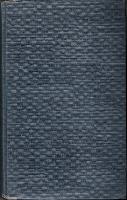

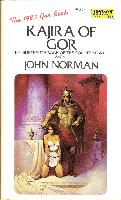

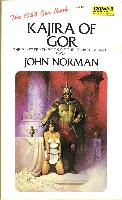


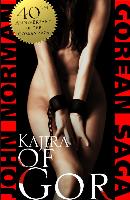

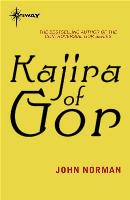



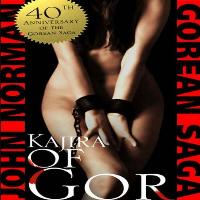

 Cover Gallery (edition)
Cover Gallery (edition)Here is a cover gallery showing all the editions and printings of Kajira of Gor, sorted by edition. Click on any cover to see the book.

















 This page is copyright © 2000/2013 by Simon van Meygaarden & Jon Ard - All Rights Reserved
This page is copyright © 2000/2013 by Simon van Meygaarden & Jon Ard - All Rights Reserved